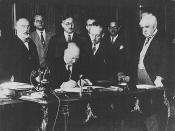Throughout the years, humans have rewritten what true love means. The contemporary meaning of true love is the feeling of lightheartedness that one experiences when around another human. True love in Shakespeare and Donne's time period, was a deep spiritual and emotional connection towards two humans. The connection never fades and grows stronger with separation. Many people believe that one can fall in and out of love; however, many poets wrote about a love that will never disappear. The love that they depicted regarded the truest of all loves. As beauty and time fades, true love will remain forever strong.
William Shakespeare's Sonnet 116 is an extremely well-known poem for its description of true love. The love that the persona describes does not admit impediments and is unchanging and perfect. According to him, love acts like a guiding star for lost ships, not shaken in storms. Love will guide two people throughout their lives and will not fall apart in the stormy times.
Shakespeare is completely certain that what he describes is true love to the point where he says that if his statements can be proved false, then he should have never written a single word and that no man has ever been in love. The ideal, romantic love outlasts even death and admits no flaw. Throughout the three quatrains, Shakespeare breaks down love into the simplest forms; in quatrain one, he states that love is not changeable; in
Jones 2
quatrain two, love is a like a fixed mark that guides ships throughout storms; and in the third quatrain, he says that love is not Time's fool, stating that he is certain that what he describes is true love. "It proposes a love which exists in an unchanging present, impervious to time's millioned accidents" (Hammond 211). The start...


